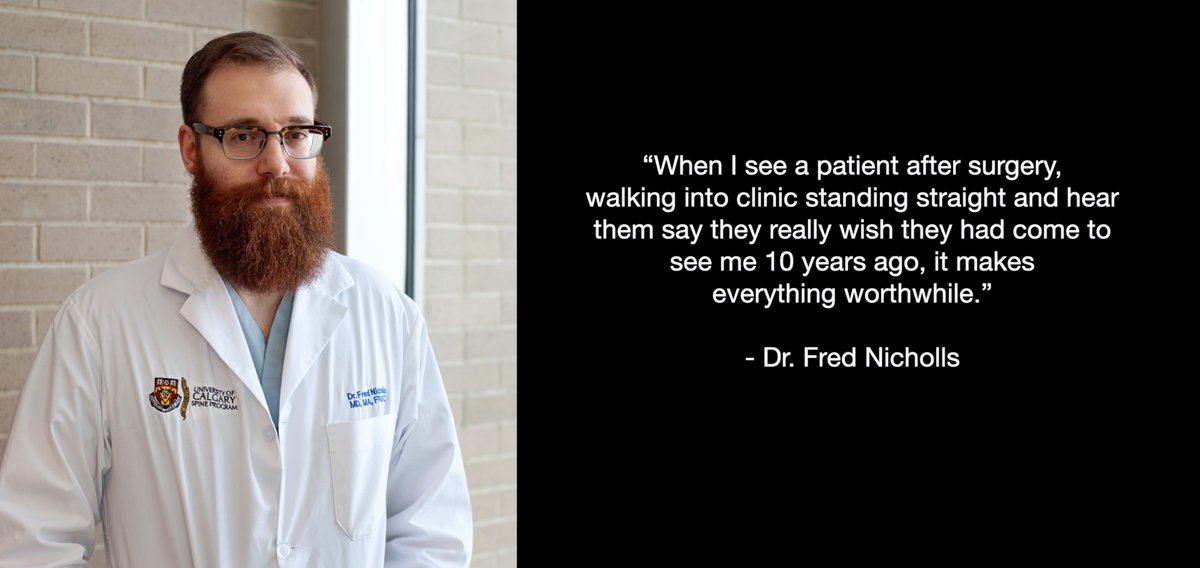It’s not easy to live with pain. One patient was facing his third back surgery when he met Dr. Fred Nicholls. This time, the surgery changed his life.
“It is absolutely impossible to describe the bitter pre-op pain I was experiencing. Not only was it affecting me physically, but it was also seriously affecting my mental health. I was a medic, paramedic and trauma nurse for over 40 years and have seen the good, bad and the ugly. My wife (who also worked in health care for 35 years) and I were astounded after meeting Dr. Nicholls.
“He had a very high rating as a back surgeon, but what took us by surprise was Dr. Nicholls’ demeanour. Dr. Nicholls is one of the most empathetic, kind and gentle men I have ever met. His explanations were clear and concise. I was never rushed with appointments, and his surgical skills were second to none. Dr. Nicholls gave me a new lease on life as I can finally function again!
“I don’t know how I would have managed pre-op if not for Dr. Nicholls. I cannot think of anyone who deserves Shine A Light recognition more than he.”
Dr. Nicholls is a clinical assistant professor with the department of surgery, division of orthopaedic surgery, at the U of C, and the Fellowship Director of the combined spine program. A childhood experience influenced his path to medicine. Let’s learn more about what inspired his career choice.

How long have you been practicing medicine?
I graduated from medical school at Queen’s University in 2008, after which I completed my residency in orthopedic surgery at the University of Toronto in 2013, followed by a spine fellowship at the University of California San Francisco in 2014. I have been in practice in Calgary since completing my fellowship in 2014.
Why did you choose to focus your practice on orthopedic surgery?
When I started my medical education, I had a clear bias towards orthopedic surgery. I was involved in a motor vehicle accident as a child, breaking my right femur and spending the summer in traction. The accident exposed me to the medical system at an early age and certainly left a big impression on me as to the personal impact physicians could have, although my interests drifted away early on.
As I progressed through my post-secondary education, my studies slowly concentrated more and more into biology, culminating with my graduate studies in bone biology and thesis on fracture repair. A strong desire for practical application of my academic interests, combined with the early emotional influence, led to my eventual decision to pursue medicine.
When I started medical school, I tried to find the surgeon who had treated me when I was a child. I contacted him at his new practice in the USA and arranged an observership, but when I arrived, he was on vacation (back in Ontario, no less). I ended up spending my time observing a surgeon whose practice had a strong focus on scoliosis. The surgery seemed complicated and technically challenging but profoundly impactful on the patients, which really appealed to me.
When I began my spine rotations during my orthopedic residency in Toronto, I had the opportunity to train under gifted surgeons, compassionate physicians and incredible mentors who were passionate about their specialty. Their ability to make the concepts surrounding the spine seem logical, straightforward and natural left a lasting impression. Each had something different they seemed to do intuitively, although all were exceedingly challenging when I had the opportunity to try them myself.
I have spent my early career striving to develop just a fraction of this skill and do so with patience, empathy and understanding in the hope that I can pass on the same passion to the next generation of trainees.
What do you find most satisfying about your work?
Seeing the difference that restoring the alignment of someone’s spine can make, letting them return to doing things they had given up for so long, cannot really be explained. When I see a patient after surgery, walking into clinic standing straight and hear, “I really wish that I had come to see you 10 years ago,” it makes everything worthwhile.
I really do believe that for anyone practicing academic surgery, however, it is important to find satisfaction in research, education and administration as well. A lot of this comes together in my role as the fellowship director for the Calgary spine program. The pride I feel seeing our fellows go out and have the same impact in their new communities is a real motivator for me, and keeps me excited to continue my practice, regardless of any struggles that come up along the way.
About The Shine A Light Program
The Shine A Light Program recognizes and profiles AMA member physicians who are making a difference by:
- Spearheading projects that improve patient and/or community life
- Diligently following/tracking patients to ensure coordinated care
- Working long hours and adjusting schedules to meet patient needs
- Contributing to Alberta’s vision of a high-performing health care system
We’re looking forward to your nominations and to shining a light on physicians who put Patients First® in everything they do.
